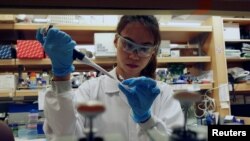As the United States faces its worst week of the COVID-19 pandemic, signs of hope are appearing from hard-hit regions elsewhere in the world.
Travel and business restrictions are slowly lifting in the Chinese city of Wuhan, where the outbreak started. In Italy and Spain, two of the worst-hit countries, the number of deaths per day from the disease has declined.
These indicators raise hopes that a return to something like normal may be on the distant horizon.
However, experts urge caution. There is only one way COVID-19 will be defeated forever — when enough people have developed immunity to it that it can no longer spread easily from person to person.
It's known as "herd immunity," and it can happen in one of two ways.
Vaccine vs. the natural way
The preferred option: developing and widely distributing a vaccine by next year.
"A vaccine is really what's going to end this thing," said Tim Schacker, vice dean for research at the University of Minnesota Medical School.
"Not for a long time, of course," he added.
Vaccines work by mimicking what happens in the body during infection without making patients sick. The patient gets a weakened version of the germ, which triggers the body's immune system to produce antibodies. These antibodies provide protection against repeat infection.
Two vaccine candidates have entered testing. But it will be at least a year before scientists know if either one is safe and effective. Then, enough vaccine needs to be manufactured and distributed around the world to prevent the virus from popping up again.
The second, more hazardous way is what happens naturally when most of the population gets infected. But it only helps the survivors. Many people die in the meantime.
When enough people have been infected and survive, the virus can't find new hosts. "There just aren't enough people to sustain productive infection over time," Schacker explained, and the outbreak fizzles out.
Unknowns
The percentage of people that need to have antibodies in order to provide herd immunity varies from germ to germ.
"How many people does it take with this particular virus? I don't know," Schacker added.
And since only a few places have done wide-scale testing, scientists don't know how many people in a community have been infected but had only mild or no symptoms.
Even for those who have developed immunity, "we don't know how effective it is or how long it will last," said William Hanage, associate professor of epidemiology at Harvard T.H. Chan School of Public Health.
Scientists are working to develop tests to identify people with antibodies to the coronavirus in their blood. That will help answer some of these questions.
These tests also could help to restart the economy.
"If you could test and know the (antibody) status of people, that would help you make the decision of whether they could return to work," said global health professor Jon Andrus at George Washington University.
Shut-in again
Once things start up, however, they may need to shut down again.
Until a vaccine arrives, officials may need to impose "repeated rounds of physical distancing," said Harvard's William Hanage, loosening restrictions but then reinstating them "when we notice that the rates of transmission are starting to increase again."
The ability to loosen up, he added, will depend on how much the health care system has improved, including the ability to test and isolate new cases.
The final factor that will determine whether COVID-19 can be defeated once and for all is whether it lives in another animal, known as a reservoir, from which it can reinfect people.
Scientists don't know the original source of SARS-CoV-2, the virus that causes COVID-19, but it is very similar to a coronavirus found in bats. If the virus continues to circulate in bats, that makes eliminating the disease "very challenging, if not impossible." Andrus said.
"Because you can't go vaccinate bats," he added.








